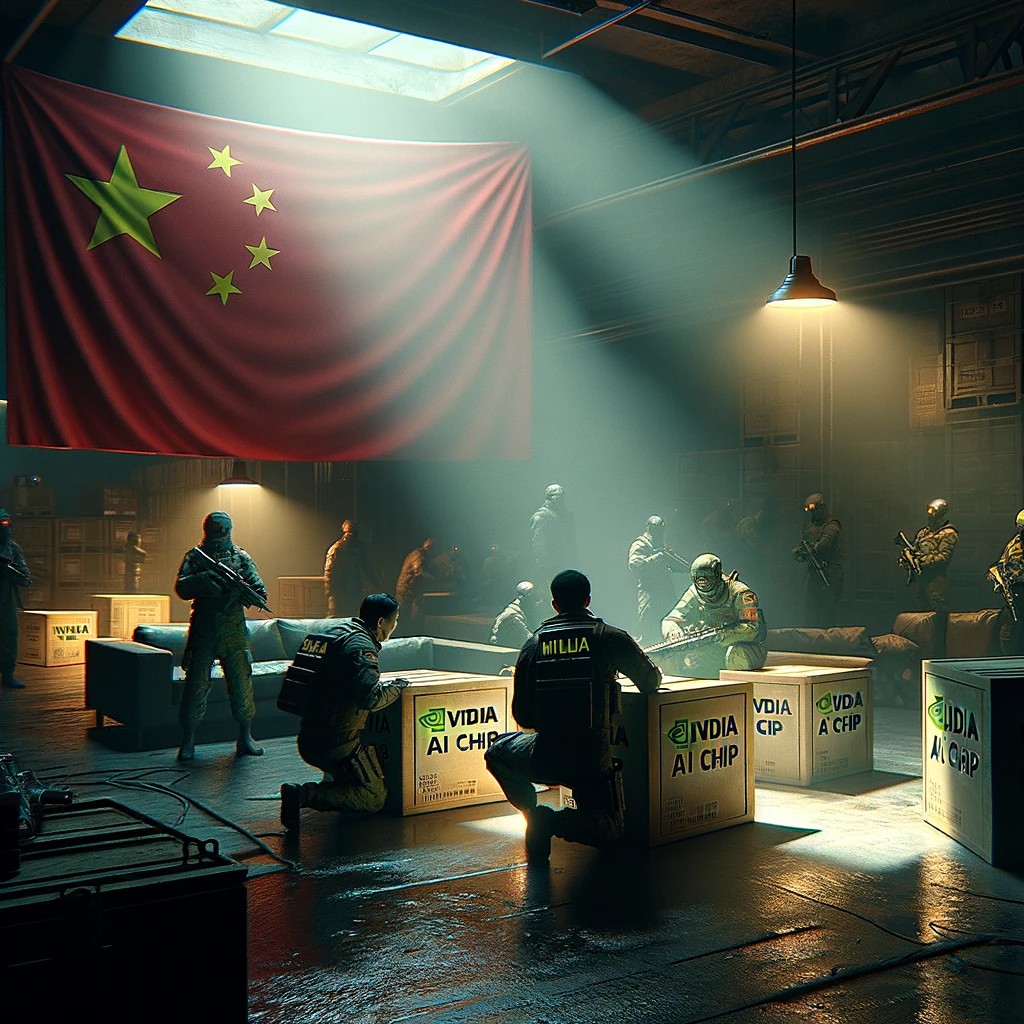In a clandestine move that challenges U.S. export restrictions, Chinese military entities, state-run AI research institutes, and universities have been discreetly acquiring Nvidia AI chips, including those banned by the U.S. for export to China.
A comprehensive review of tender documents by Reuters unveils a persistent demand for Nvidia’s cutting-edge semiconductors, reflecting the ongoing struggle of Washington to sever China’s access to advanced U.S. chips. The purchases include the banned A100 and H100 models, raising questions about the efficacy of export bans and the emergence of an underground market for these high-end chips in China.
The pursuit of Nvidia AI chips despite bans
Despite the prohibition imposed on the export of Nvidia semiconductors to China, a Reuters investigation into tender documents has uncovered a persistent acquisition of these high-performance chips by various Chinese entities. The ban, implemented in September 2022 and further extended in October, specifically targeted the A100 and H100 models, which are crucial for advanced artificial intelligence and computer applications.
The acquisition of these Nvidia chips has not been limited to private entities but also includes state-run research institutes, elite universities, and even entities subject to U.S. universities with export restrictions, including China’s University of Electronic Science and Technology and Harbin Institute of Technology.
The purchases shed light on the considerable difficulties faced by the U.S. in enforcing bans effectively. While buying or selling high-end U.S. chips is not illegal in China, the acquisition of banned Nvidia chips showcases the inadequacy of Washington’s efforts to restrict China’s access to cutting-edge technology. The A100 and H100 chips, known for their superior performance in AI work, remain in demand despite bans, emphasizing the lack of viable alternatives for Chinese firms. Before the bans, Nvidia held a dominant 90% share of China’s AI chip market, showcasing the significance of these chips in the country’s technological landscape.
The Reuters review also exposes the emergence of an underground market for banned Nvidia chips in China. Chinese vendors, responding to the demand, have reportedly been acquiring excess stock from large U.S. firms or importing through locally incorporated companies in countries like India, Taiwan, and Singapore. This clandestine trade further complicates U.S. efforts to restrict chip access, highlighting the challenges in enforcing export controls on small, easily smuggled commodities like chips. Nvidia, in response, emphasizes its compliance with export control laws and vows to take action against any unlawful resale.
The review of over 100 tenders reveals that state entities, including military bodies and AI research institutes, have actively procured Nvidia A100 chips. Notably, tenders from the military database indicate purchases by an unnamed People’s Liberation Army entity based in Wuxi, Jiangsu province. The motives behind such acquisitions remain shrouded in secrecy due to heavy redaction in military tenders. Despite the relatively small quantities procured, most tenders indicate the chips’ utilization for AI purposes, raising concerns about the potential enhancement of existing AI models.
The academic needs of China
Elite universities, including Tsinghua University and Chongqing University, have been prolific issuers of tenders for Nvidia A100 chips. Tsinghua University alone has acquired approximately 80 A100 chips since the ban in 2022, emphasizing the persistent demand within academic institutions.
Tenders from research labs, such as the Ministry of Industry and Information Technology, showcase the diversity of entities seeking access to these high-end chips. While the quantities may not be sufficient to build large AI models from scratch, they are capable of running complex machine-learning tasks and augmenting existing models.
Military tenders, often heavily redacted, provide limited insights into the specific applications of Nvidia chips in military contexts. The review identifies tenders where a People’s Liberation Army entity sought A100 and H100 chips, hinting at potential applications in military AI development. The lack of transparency raises questions about the extent of the military’s involvement and the possible impact on national security.
As China’s military, research institutes, and universities continue to acquire banned Nvidia AI chips, the efficacy of U.S. export restrictions comes into question. The persistent demand, coupled with the emergence of an underground market, reveals the challenges in controlling the flow of high-end chips to China. The implications for both technological competition and national security are profound. In this complex landscape, where Nvidia’s chips remain in high demand despite bans, one must wonder: How will these acquisitions shape the future of AI development, and what role will advanced chips play in the evolving geopolitical dynamics of technological prowess?
A Step-By-Step System To Launching Your Web3 Career and Landing High-Paying Crypto Jobs in 90 Days.
